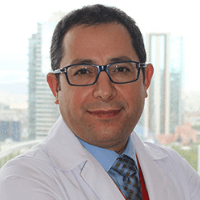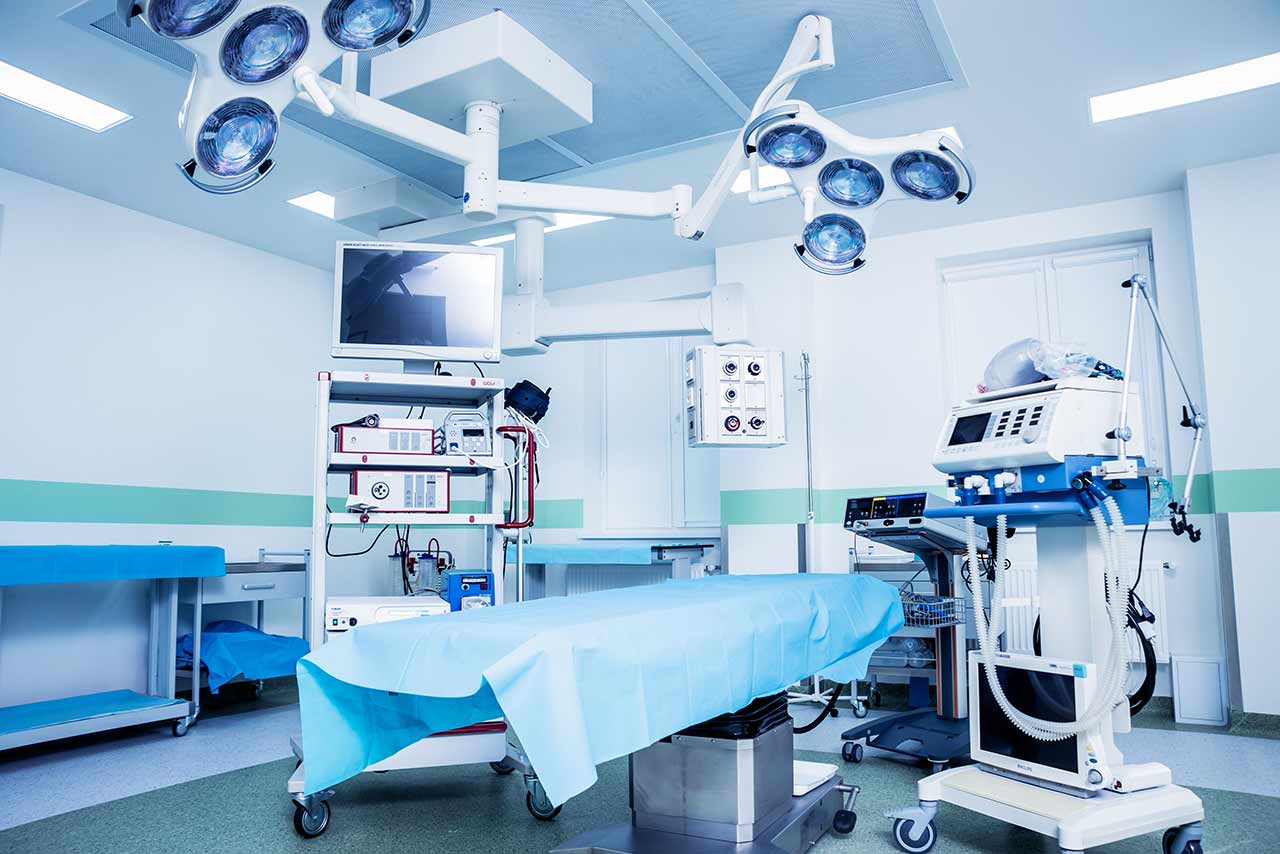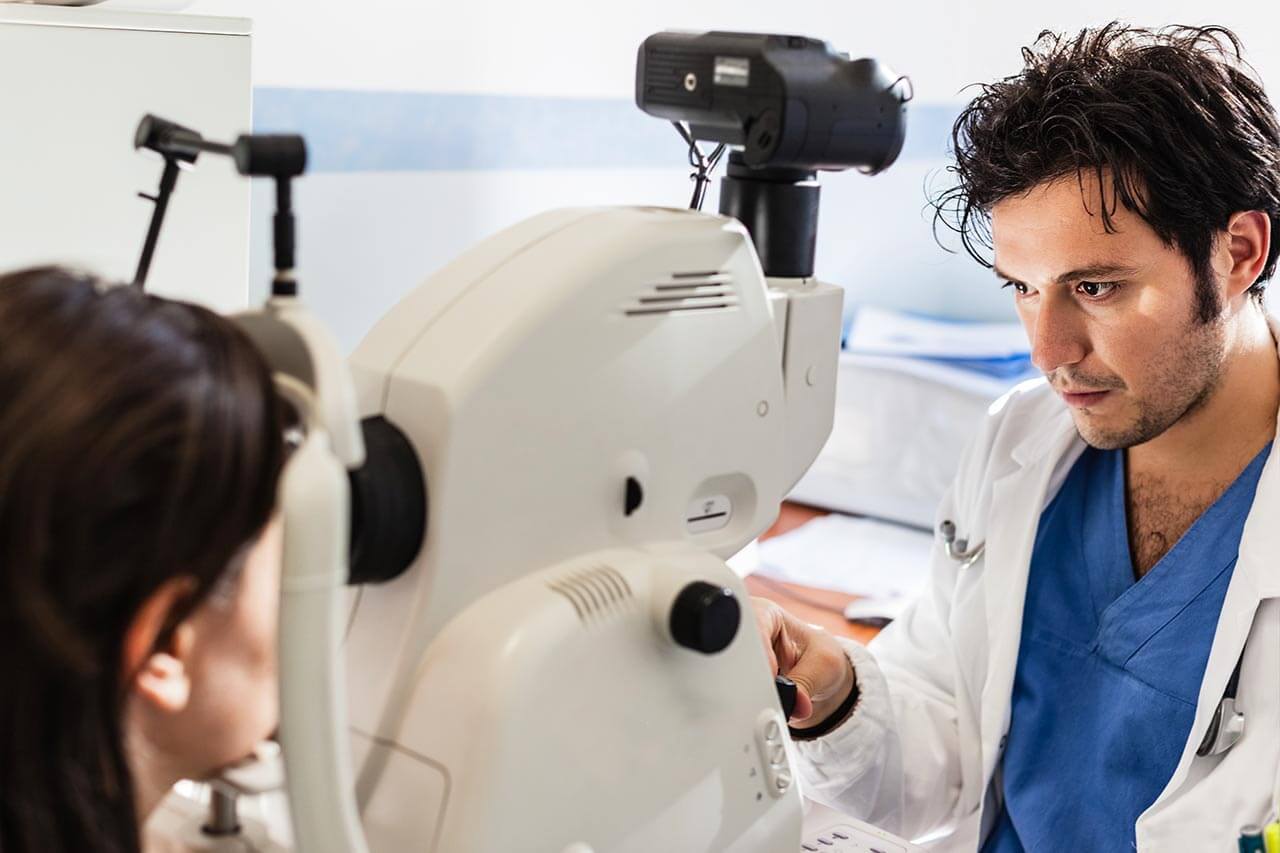
The program includes:
- Initial presentation in the clinic
- clinical history taking
- review of medical records
- physical examination
- laboratory tests:
- complete blood count
- general urine analysis
- biochemical analysis of blood
- TSH-basal, fT3, fT4
- tumor markers
- inflammation indicators
- indicators of blood coagulation
- orbital ultrasound scan
- CT / MRI / X-ray scan of the head and orbit
- 1 course of chemotherapy
- nursing services
- consultations of related specialists
- explanation of individual treatment plan
How program is carried out
During the first visit, the doctor will conduct a clinical examination and go through the results of previous laboratory tests and instrumental examinations. After that, you will undergo an additional examination, including laboratory assessment of liver and kidney function, ultrasound scan. Based on the received results, the doctor will elaborate the chemotherapy regimen. If necessary, related medical specialists will be involved in the elaboration of a treatment regimen (tumor board).
Chemotherapy is carried out as the day hospital procedure, without mandatory admission to the hospital. After the placement of a venous catheter, you will stay in a comfortable ward. An infusion system will be connected to the catheter, through which the required drug or a drug combination will be administered. All drugs are administered by intravenous drip, slowly, so the total duration of the infusion can be up to several hours. All this time, doctors and nurses will monitor your health condition closely.
After the course of chemotherapy, you will stay under medical supervision in the ward for a few more hours. If your general condition is good, your doctor will allow you to leave the hospital. You will receive the medical report with detailed recommendations regarding further treatment. In the future, you will be able to have a distant consultation with your attending physician and schedule the next course of chemotherapy, if necessary.
Required documents
- Medical records
- MRI/CT scan (not older than 3 months)
- Biopsy results (if available)
Service
You may also book:
 BookingHealth Price from:
BookingHealth Price from:
About the department
The Department of Pediatric Oncology, Hematology and Bone Marrow Transplantation at the Memorial Ankara Hospital offers the full range of high quality medical services in the areas of its specialization. The department deals with the treatment of children of different age groups with benign and malignant diseases of the hematopoietic system, solid neoplasms of various localization. The department successfully performs autologous and allogeneic bone marrow transplants in children with blood cancer. When diagnosing and treating young patients with solid tumors, the department's specialists quite often involve the doctors of related medical specialties, namely pediatric surgeons, neurosurgeons, orthopedic doctors, ophthalmologists, ENT doctors and others. The excellent equipment of the medical facility and the highest professionalism of pediatric doctors make it possible to perform the most accurate detection of the slightest pathological changes in the child's body, provide each young patient with individual and the most effective treatment using the very latest therapies. In addition, the department's specialists take care of the emotional state of young patients, since the upcoming treatment can often cause fear and stress in children. The department is headed by Prof. Dr. med. Ahmet Demir.
The first and decisive stage of treatment is accurate diagnostics using various laboratory and imaging tests. During the diagnostics, the doctors have the task to obtain comprehensive data on the type of tumor or malignant blood pathology, stage of the malignant process, localization and size of solid neoplasms. When elaborating a treatment regimen, the board of doctors also always takes into account the age of the child and his general health.
The doctors mostly have to deal with such life-threatening diseases in their clinical practice as leukemia, brain tumors, lymphomas, kidney and adrenal gland tumors, soft tissue and bone tumors, as well as eye tumors (especially retinoblastoma). The department also often admits the young patients with benign blood diseases. Of particular interest to hematologists is the treatment of iron deficiency and B12 deficiency anemia, structural and acquired aplastic anemias, thalassemia and hemophilia.
In the case of solid tumors, surgery is most often the first line therapy. To achieve the best therapy result, the doctors need to remove the entire tumor. The surgical treatment is performed using minimally invasive surgical techniques, which minimize the likelihood of postoperative complications, and also significantly accelerate the recovery process in the young patients. In some cases, the surgeons can perform operations with access through natural openings – the esophagus, the nasal passage. However, the doctors are not always able to remove all malignant cells during the surgical procedure, so the treatment regimen can be supplemented with chemotherapy, targeted therapy, radiation therapy, immunotherapy and other methods. Chemotherapy is the basis of the treatment protocol for lymphoma, leukemia and retinoblastoma. For chemotherapy treatment, the department's doctors use modern and proven drugs, which aim to totally destroy tumor cells, but have minimal destructive effect on the healthy cells. In most cases, the drug is injected directly into the tumor, using a central catheter or port system. To carry out radiation therapy, the doctors use progressive linear accelerators, which allow them to perform high-precision focusing of the maximum dose of radiation on the target without harming healthy surrounding tissues. Thus, all the therapeutic options guarantee not only highly effective, but also sparing treatment.
The department's service range is complemented by autologous and allogeneic bone marrow transplantation for the treatment of malignant hematological diseases. In the first case, the patient's own stem cells are used for the transplant procedure, while in the second one, donor material is required. Bone marrow transplantation is performed in specially equipped treatment rooms with the strictest adherence to all hygiene and safety standards in order to exclude treatment complications (for example, infectious lesions). The department's specialists perform bone marrow transplantation using an innovative technique, which does not require any surgical manipulations. The essence of the procedure is donor material harvesting using apheresis, proper processing of the donor samples and their further transplantation through the vascular access. Bone marrow cells have special biological properties, so they can independently enter the bone marrow and begin the production of blood cells there. It is worth noting that a bone marrow transplant is always preceded by the preparation of the patient – intake of certain drugs, as well as several courses of chemotherapy in the case of the upcoming transplantation of the patient's own bone marrow cells. After the transplant procedure, the child is provided with careful monitoring and stays in a sterile isolated ward in order to avoid complications or rejection of the transplanted material.
The department's range of medical services includes:
- Diagnostics and treatment of hematological diseases
- Malignant hematological diseases
- Leukemias
- Myelodysplastic syndrome
- Hodgkin's lymphoma
- Non-Hodgkin's lymphomas
- Benign hematological diseases
- Aplastic anemia
- Thalassemia
- Paroxysmal nocturnal hemoglobinuria
- Fanconi anemia
- Sickle cell anemia
- Severe combined immunodeficiency
- Wiskott-Aldrich syndrome
- Hemophagocytic lymphohistiocytosis
- Kostmann syndrome
- Chronic granulomatous disease
- Malignant hematological diseases
- Diagnostics and treatment of solid malignant tumors
- Neuroblastoma
- Soft tissue and bone tumours
- Brain tumors
- Germ cell tumors
- Kidney tumors
- Eye tumors
- Bone marrow transplantation using innovative non-surgical techniques
- Autologous bone marrow transplantation
- Allogeneic bone marrow transplantation
- Diagnostics and treatment of other diseases, other therapeutic procedures
Curriculum vitae
Professional Career
- Since 2014 Head of the Department of Pediatric Oncology, Hematology and Bone Marrow Transplantation at the Memorial Ankara Hospital, Ankara, Turkey.
- 2009 - 2014 Physician in the Department of Pediatrics at the Training and Research Hospital in Ankara, Turkey.
- 2008 - 2009 Doctor at the Military Hospital, Siirt, Turkey.
- 2000 - 2005 Research Fellow, Department of Pediatrics, Faculty of Medicine, Hacettepe University, Ankara, Turkey.
Higher Education and Postgraduate Training
- 2005 - 2009 Specialized training in Pediatric Oncology, Faculty of Medicine, Hacettepe University, Ankara, Turkey.
- 1993 - 2000 Study of Human Medicine, Faculty of Medicine at Istanbul University, Istanbul, Turkey.
Memberships in Professional Societies
- 2006 International Society of Paediatric Oncology (SIOP).
- 2009 Turkish Pediatric Oncology Group (TPOG).
- 2009 Turkish Medical Association.
- 2013 Member of the Scientific Board of the Turkish Pediatric Oncology Group (TPOG).
- 2013 Board Member of the Pediatric Oncology East and Mediterranean Group (POEM).
Photo of the doctor: (c) Memorial Ankara Hospital
About hospital
The Memorial Ankara Hospital is one of the largest private medical complexes in the capital of Turkey, where patients can undergo top-class diagnostics and treatment in all fields of modern medicine. The hospital is part of the prestigious Memorial Healthcare Group. The doors of the medical facility were first opened in 2014, and since then its employees have been doing their best to maintain the credibility of the hospital both throughout the country and far beyond its borders. For exceptional medical service, the hospital was awarded the Joint Commission International (JCI) certificate, which is given only to the best medical centers around the world.
The hospital is located in a modern building with an area of 42,000 square meters. The medical facility has 230 beds for the accommodation of patients. It includes 63 specialized departments – each of them specializes in a particular medical field. The key focuses are ophthalmology, plastic surgery, cardiology, cardiac surgery, orthopedics and oncology.
The hospital includes 11 modern operating rooms. They use special LED lamps, which prevent thermal emission and comply with the international sterilization technologies. The hospital also has hybrid operating rooms, which are equipped for minimally invasive operations.
Special attention should be given to the medical and technical base of the medical complex. It includes state-of-the-art diagnostic devices for MRI, CT, PET-CT, as well as TrueBeam STx and Elekta Versa HD radiation therapy devices, and many other innovative systems, which guarantee the patient the most effective results and maximum comfort.
Naturally, the medical staff of the medical facility also plays a key role in the successful clinical practice. The health of the patients is in good hands of the highly qualified doctors who have comprehensive professional training, many years of experience and regularly demonstrate excellent treatment results. The responsive nursing staff provides patients with quality care. In addition, all the staff of the hospital show a friendly and respectful attitude towards the patients.
Photo: (c) depositphotos
Accommodation in hospital
Patients rooms
The patients of the Memorial Ankara Hospital live in cozy single rooms and luxury rooms. Each patient room has all the amenities for maximum comfort. The hospital also has specially equipped rooms to accommodate disabled patients. The patient rooms are equipped with all necessary furniture, TV, telephone, ensuite bathroom with shower and toilet. The patient rooms also have Wi-Fi. The rooms are designed in a pleasant light color scheme, while the large panoramic windows offer a beautiful view of the capital of Turkey.
Meals and Menus
The patient and the accompanying person are offered tasty and balanced three meals a day. If for some reason you do not eat all foods, you will be offered an individual menu. Please inform the medical staff about your food preferences prior to treatment.
Further details
Standard rooms include:
Accompanying person
During the inpatient program, the accompanying person can live with the patient in a patient room or a hotel of his choice. Our managers will help you choose the most suitable option.
Hotel
During an outpatient program, the patient can stay at the hotel of his choice. Our managers will help you choose the most suitable option.




